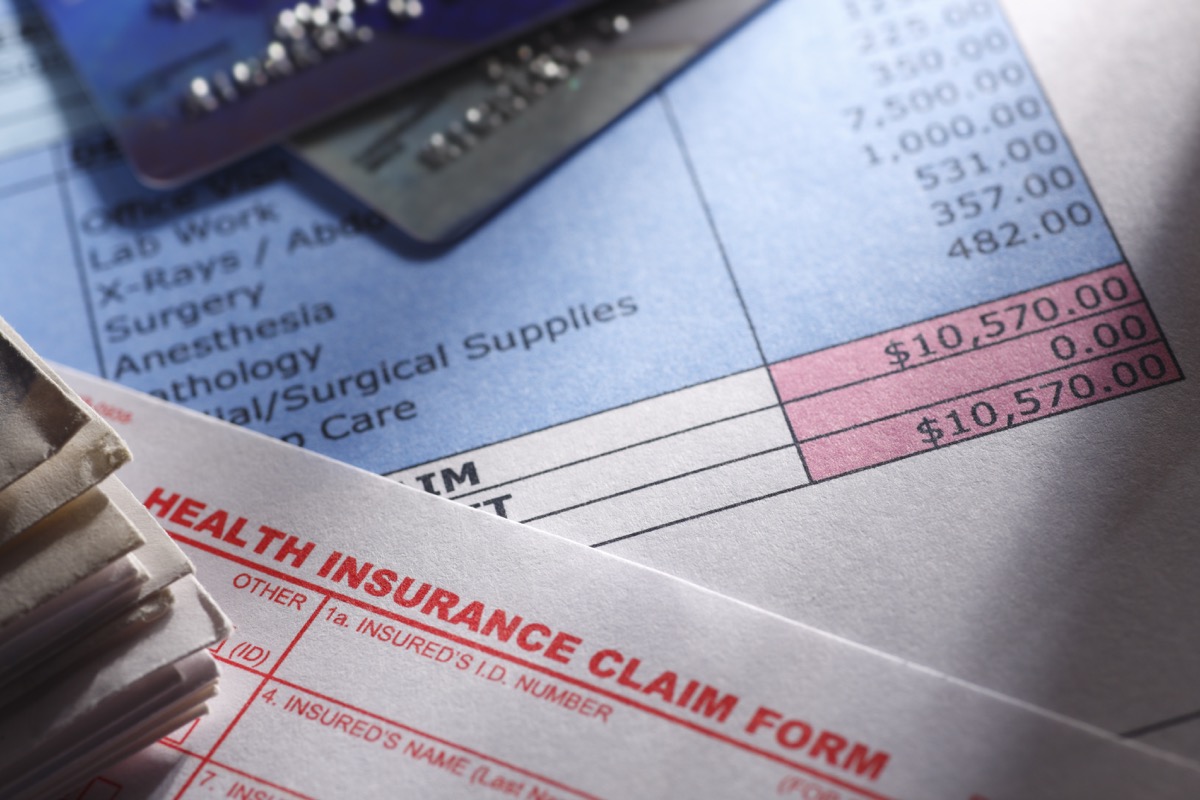Never Do This When You Get a Medical Bill, Experts Warn
This mistake could be costing you a lot of money.

These days, it's rare you get anything in the mail you're excited about. It's mostly flyers going in the recycling bin or it's a bill you're not thrilled to see. And nothing comes with as much mystery as a medical bill, which could cost you far more than you hoped. Even that quick trip to a same-day care center can run you hundreds or thousands of dollars depending on your insurance. But there's also a chance you're hurting yourself—and your finances—even more by doing something in particular with your medical bills. Read on to find out what experts say you should never do when you get a medical bill.
Experts say you should never immediately pay your medical bill at face value.

Medical expenses in the U.S. are not cheap by any means, even if you have good health insurance. That's precisely why experts say you should never immediately pay your medical bill without questioning the amount you're being charged. AnnMarie Mcllwain, a seasoned medical billing and patient advocate with the Alliance of Professional Health Advocates, told Insider that it's always worth it to try to negotiate a medical bill, especially if it's going to hurt you financially. Many people end up getting their medicals bill reduced or even waived just by a single phone call to their healthcare provider. A Consumer Reports survey from 2018 found that 57 percent of people had successfully negotiated a lower bill after contacting their healthcare provider.
Your medical bill may also contain errors.

Calling your provider can also help you determine if any errors were made on your bill, which is a distinct possibility. According to Beckers Hospital Review, bill advocates and other health care professional estimate that up to 80 percent of medical bills contain errors, typically ones that are costing you more money. Pat Palmer, the chief executive officer for Medical Billing Advocates of America, told New Jersey radio station 101.5 that her organization finds errors on three out of four medical bills they review.
"We are seeing a lot of the error types escalating, especially in the hospital area. We have such a complex billing system, that it leaves so much room for errors to occur on medical bills, and that is what we are seeing," Palmer explained. "Most every bill that comes through our office, when we analyze it, there is some type of error that has occurred, and it is usually not in favor of the patient."
And for more up-to-date information to help you navigate your day to day, sign up for our daily newsletter.
You should also ask your provider to send you an itemized bill.

When you get a medical bill in the mail, you may only be seeing the total you owe and not a breakdown of all the expenses. As David Vivero, CEO and co-founder of health care guidance platform Amino, explained to U.S. News & World Report that you should call your provider's billing department and ask for an itemized bill whenever you have a large medical bill or a bill that is more than you expected it to be. This will allow you to see everything you are being charged for so you can make sure it matches the actual care you received.
At the end of the day, "patients should not accept anything that is either wrong or they don't understand," Florian Otto, co-founder and CEO of Cedar, a platform that provides medical billing services, told U.S. News & World Report. You can contact both your provider and your insurer to dispute a bill.
Not paying immediately won't affect your credit either.

Many people pay medical expenses immediately because they are afraid that not doing so will affect their credit. However, Caitlin Donovan, a health care policy expert at the National Patient Advocacy Foundation, told Insider that "no bill can appear on your credit score for 180 days." That means you have at least six months to try and negotiate with your healthcare provider or insurer. Mcllwain said she recommends calling your healthcare provider's billing office to let them know you are contesting a bill and request that they put a hold on your case, which means it won't show up as debt and affect your credit score.
RELATED: The IRS Says You Could Get Money in July, If You Meet This Requirement.





















